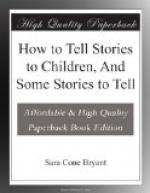I realise that this has an incongruous sound, when applied to such stories as that of the little pig at the stile or of the greedy cat who ate up man and beast. But, believe me, it does apply even to those. For the transmittable thing in a story is the identifying essence, the characterising savour, the peculiar quality and point of view of the humour, pathos, or interest. Every tale which claims a place in good fiction has this identifying savour and quality, each different from every other. The laugh which echoes one of Seumas McManus’s rigmaroles is not the chuckle which follows one of Joel Chandler Harris’s anecdotes; the gentle sadness of an Andersen allegory is not the heart-searching tragedy of a tale from the Greek; nor is any one story of an author just like any other of the same making. Each has its personal likeness, its facial expression, as it were.
And the mind must be sensitised to these differences. No one can tell stories well who has not a keen and just feeling of such emotional values.
A positive and a negative injunction depend on this premise,—the positive, cultivate your feeling, striving toward increasingly just appreciation; the negative, never tell a story you do not feel.
Fortunately, the number and range of stories one can appreciate grow with cultivation; but it is the part of wisdom not to step outside the range at any stage of its growth.
I feel the more inclined to emphasise this caution because I once had a rather embarrassing and pointed proof of its desirability,—which I relate for the enlightening of the reader.
There is a certain nonsense tale which a friend used to tell with such effect that her hearers became helpless with laughter, but which for some reason never seemed funny to me. I could not laugh at it. But my friend constantly urged me to use it, quoting her own success. At last, with much curiosity and some trepidation, I included it in a programme before people with whom I was so closely in sympathy that no chill was likely to emanate from their side. I told the story as well as I knew how, putting into it more genuine effort than most stories can claim. The audience smiled politely, laughed gently once or twice, relapsed into the mildest of amusement. The most one could say was that the story was not a hopeless failure. I tried it again, after study, and yet again; but the audiences were all alike. And in my heart I should have been startled if they had behaved otherwise, for all the time I was telling it I was conscious in my soul that it was a stupid story! At last I owned my defeat to myself, and put the thing out of mind.
Some time afterward, I happened to take out the notes of the story, and idly looked them over; and suddenly, I do not know how, I got the point of view! The salt of the humour was all at once on my lips; I felt the tickle of the pure folly of it; it was funny.
The next afternoon I told the story to a hundred or so children and as many mothers,—and the battle was won. Chuckles punctuated my periods; helpless laughter ran like an under-current below my narrative; it was a struggle for me to keep sober, myself. The nonsense tale had found its own atmosphere.




